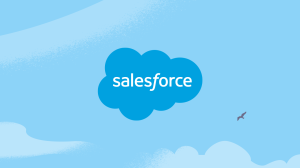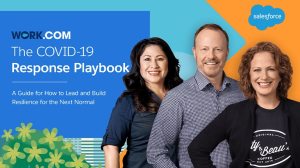Digital Transformation
University of Colorado Rides ‘Waves of Change’ with Salesforce Admissions Connect

Today Salesforce announced the launch of Admissions Connect, new technology in Education Cloud that helps modernize the recruitment and admissions process for both applicants and admissions teams through streamlined application review, stronger applicant engagement and a more personalized student experience.
The University of Colorado at Colorado Springs (UCCS) is an early adopter of Admissions Connect. UCCS used the product to reduce the manual processing during application review, build deeper relationships with prospective students and provide them with the personalized communications experience that they expect in today’s all-digital world.
We sat down with CU president Mark Kennedy to discuss some of the challenges from the past year, what the post-COVID future looks like, and how they are using Salesforce to drive admissions success.
Q: Could you share a bit of background on University of Colorado and your role at the organization?
I am president of the University of Colorado, a four campus system (Boulder, Colorado Springs, Denver and the Anschutz Medical Campus) serving some 67,000 students. CU is among the top 10 public research universities in the nation, with faculty garnering some $1.2 billion annually in research funding. CU has five Nobel Prize-winning faculty, nine MacArthur Fellows and is a national leader in aerospace, geosciences, biotechnology, business, health sciences and the arts. The university plays a profound role in the lives of individuals, businesses and communities throughout Colorado, across the country and around the world. We have nearly a half million alumni around the globe, and they are joined by some 15,000 new graduates annually. CU has a $12.4 billion annual economic impact on Colorado.
Q: What were some of the major challenges University of Colorado experienced because of the pandemic?
First and foremost, we had to switch to remote teaching and learning virtually overnight in mid-March 2020. We also had to take several steps to ensure the health and safety of our community. Our research labs were by and large shuttered. We had to nearly shut down some of our key enterprises, such as housing and dining. The pandemic-related revenue reductions and cost increases, combined with lower state funding, left CU with a $218 million budget challenge even after federal funding relief. To mitigate the uncertainty these changes caused, we had to provide timely and accurate communication to our far-flung community of students, parents, faculty, staff, elected officials and partners.
Q: How did University of Colorado solve some of these problems through the use of Salesforce technology? Why did you choose Salesforce?
Salesforce was integral to helping us communicate regularly and effectively with our key constituents. The CRM-based network we had established over a period of years allowed us to tailor and target communications. We chose Salesforce not only for the strength of its data platform offerings, but also for the effective partnership we have established over the years that allowed us to collaborate on effective solutions.
Q: How are you preparing for a post-COVID future?
The disruption we’re experiencing today is merely a taste of what lies ahead. Individuals and organizations will be forced to surmount greater challenges to succeed in the post-Covid future. At the University of Colorado, we’re looking forward and considering how we must pivot to meet the post-pandemic needs of our students, state and society.
We know we’ll need to innovate to ensure we continue to meet our mission. With disease, digitization, division and dispersion in our collective future, CU is committed to helping others ride the waves of change.
CU is responding to the changing face of education by investing in high-quality degrees and non-degree credentials designed for online learners. We’re investing in our technological infrastructure to enhance our ability to attract, retain and graduate an increasingly diverse student body, both on campus and online.
Q: How is technology helping CU advance diversity and foster inclusion for students?
A key focus is closing the achievement gap by raising historically lower graduation rates for less-represented minorities. By investing in a lifecycle CRM, we aim to ensure advisors have a deeper understanding of each individual student and the challenges they face. By providing insights from analytics, our advisors can give students timely, targeted and informed advice. By making course and degree planning tools available directly to students, we help them succeed.
As we look to enhance our diversity, equity and inclusion efforts, we know we need to ramp up our student services. While many of those services are delivered in person, we are considering how we can use technology to deliver some services, such as advising and tutoring. We have had some success engaging students with technology, augmented by good old-fashioned reaching out. Additionally, we believe technology can provide us a clearer picture of student progress at all levels.
Q: With higher ed enrollment down right now across the country, how is CU pivoting its recruiting and admissions strategy?
On-campus enrollment has been on a steady decline for some time now and that trend will continue. We are in the midst of a significant push to enhance our online offerings so we can reach learners beyond the typical high school graduate. We are targeting adult learners, people who have college credits but didn’t complete, those in the military, those in the workforce who want to earn a certificate in a specialized area to keep pace with technological advances in their current career or to change careers. Much of that recruitment and admissions work is directed at online learners. Those people expect near-instantaneous admissions decisions, so we need to pivot toward that. Yet we believe it’s not a question of online or on campus, but one of online and on campus, particularly for traditional college students.
Q: Was there a use case of Salesforce technology that surprised you? Something you initially thought wouldn’t help, but ended up making a big impact?
While I wasn’t surprised that Salesforce enabled us to track every customer interaction, it was impressive to see the results of that data in action. Based on the increased knowledge of our constituents that Salesforce is able to provide, we will be able to truly customize each communication to best fit our constituents’ interests and needs at specific points in time. This information-based interaction is key to making every point of contact relevant, meaningful and measurable.
Q: How has the pandemic shaped/impacted University of Colorado’s digital transformation initiatives moving forward?
It has accelerated them dramatically. We were moving in this direction well before the pandemic, but the fundamental ways it has changed higher education and society means that the digital transformation that many thought was up to a decade away is upon us now. We were fortunate to begin the work when we did, but we still feel a sense of urgency brought about by the pandemic.
Q: What are the long-term impacts or benefits of the COVID-19 pandemic on education?
The pandemic focused our efforts to a tremendous degree. Again, we started work on our two large initiatives – enhancing our online offerings and technology transformation – well before the pandemic. Yet as we know, higher education is not noted for being nimble. The pandemic has forced us to adapt, adjust and change in a short period of time. We’ve shown we can do it, especially a year ago when we moved to remote course delivery almost overnight. The silver lining of the pandemic is that it has demonstrated that we can and must change to meet the changing needs of our students and the manner in which they seek to access education. It is imperative that we continue that mindset while also not losing sight of what makes our university what it is.
To learn more about Admissions Connect, read our news announcement here.




